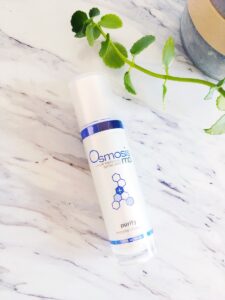Our skin has a sneaky habit of showing how we feel on the inside. If you’ve ever blushed from embarrassment, turned red from anger, or gone white from fear, then you’ve witnessed this firsthand. But not only does our skin change colour due to our emotions, it also alters when we are struggling with poor mental health. Many of us have experienced anxiety, depression, and other common mental health disorders at some stage in our lives. However, what many of us don’t know is how and why our mental health affects our skin.
There are many kinds of mental health illnesses, disorders and conditions, but two common ones are anxiety and depression. These conditions are genetic in some cases, but more than often they occur as a result of a traumatic event, or at emotionally stressful times of our lives.
Anxiety seems to pick the worst times to say hello. Whether its triggered by preparing for your final exam, an important presentation, or simply trying something new, normal stress can turn into anxious feelings that follow us wherever we go. When we are feeling down, stressed, or struggling with low self esteem, life can seem utterly hopeless. Suddenly daily tasks which used to be simple become a nightmare.
Maybe you don’t struggle with anxiety, but you’re finding this time of year a real downer. As the winter draws nearer, there is an increase in people feeling low. Some people call this the ‘winter blues’, but scientists have a real word for it. It’s called Seasonal Affective Disorder, which is also known as SAD. SAD is a kind of depression caused by having limited vitamin D and natural sunshine, so can be common at this time of year as the days get shorter.
The key symptoms of SAD include sleeping more, finding it harder to get out of bed, eating more sugar and withdrawing from friends and family. These symptoms are more common in the late autumn and early winter months when it is less sunny. However, if you work in a windowless office, or live in a basement apartment, you can develop the condition at any time of year.
The Mind and Skin
Whether you have anxiety or depression, we all have minds and we all have skin. So, it’s important we understand how to keep our physical and mental health in good shape, because there is an undeniable bond between the mind and skin. This connection has deep roots, going back to at least as far as skin-to-skin contact between mother and newborn baby. And we know from looking in the mirror during times of stress that our skin tends to look less healthy than usual. So it’s no surprise that studies have found a connection between our mental health and skin health.
Our bodies are an incredible natural machine, and like any machine, they start to malfunction if one part is not working correctly. When our mental health is poor, key functions of the body are weakened, including our immune system. A downhill spiral occurs and our skin finds it harder and harder to naturally keep itself well.
Experts in both skin and psychology have found that mental health conditions contribute directly to skin problems. For example, skin conditions such as acne are easily triggered or made worse by emotional stress. Interestingly, studies have also found that people with certain skin conditions are significantly more prone to have mental health disorders such as depression.
What happens to our skin?
During times of stress or trauma, our skin is prone to flare ups in existing skin conditions. Whether these be breakouts, full-blown acne, super sensitivity, redness or, dry, tight, rough skin, they all show how our skin’s functionality has been compromised. Then there are other skin problems that can be a little more disastrous, which can be exacerbated by stress and other emotional factors. These may include severe acne, alopecia areata (hair loss), various types of eczema or dermatitis (skin inflammation), herpes (oral and genital), hyperhidrosis (profuse sweating), pruritus (itching), psoriasis (skin scaling and redness), rosacea (skin flushing and eruption), urticaria (hives), and even warts.
Struggling with these conditions is enough to make anyone want to pull their hair out, let alone when we are trying to cope with a mental health disorder. It’s hard to feel good about ourselves if all we can see is unhealthy skin when we look in the mirror. To keep our skin looking well, we need to start feeling well too!
Here are four steps to starting this process to begin your journey to better mental health
Step One: Know you’re not alone
Mental health, like physical health, is something everyone has to deal with and work on. But just because it’s common doesn’t mean we should let these issues go untreated. Begin your treatment by realising you deserve to feel better, and that there are a million other people in this world walking the journey with you.
Step Two: Understand the science
Learning the science of the specific mental illness you might struggle with is a very helpful way to gain control over stressful situations. By understanding what’s actually happening in your brain, you begin to realise that you’re not crazy, and that this illness doesn’t control your life. Having a mental disorder doesn’t mean that you are incapable of living a normal life. Remind yourself if you’re having a panic attack or depressive episode that you are ok, and that it’s really an imbalance of chemicals in the brain which can be overcome.
Step Three: Accept help
Learning to say ‘I need help’ is the next crucial step. Realise that you deserve help, and although you may not think you are ‘really bad’ know it’s OK to seek treatment. Talk to your GP about your symptoms as they can check medical conditions (Vitamin D levels etc.) and they can direct you to the specialist who will be best suited to help you. Seeking assistance from a certified professional is important as well, because it gives you a sense of control over your mental health. If you are online in Australia at the moment and want to find out more contact Beyond Blue 1300 22 4636 or Lifeline 13 11 14.
Step Four: Be Kind To Yourself
Take the time each day to breathe – using Mindfulness to allow you to re-centre yourself. Look after your body; through healthy food, gentle exercise, organic skincare (such as Organic Nation, pictured before) and positive mental influences. Ensure you have adequate time in the sunlight to get your daily Vitamin D.
Maintaining Good Skin in Times of Stress
Now we know how to maintain our mental health, it’s time to find out how to keep our skin looking well, while we treat our mind. We can do our best to maintain a good mental health, but unfortunately the unexpected can always occur, as life can always throw a curve ball your way!
Our skin feels the pressure of stress similarly to the rest of our bodies. Here are some top tips to keep our skin and health under control when our lives are in chaos:
Skin Care:
- Choose chemical-free
- –Your skin is already inflamed so why add fuel to the fire by treating your skin concern with toxic chemicals. Aim to use products which have a high % of organic (not just natural) ingredients.
- -Even if you have acne and feel your skin is oily, avoid harsh products which can inflame and strip the skin. You need to look for products to strengthen, hydrate and are anti-inflammatory. You want to soothe your skin, giving it the chance to heal itself as your mental state and gut health improve.
A nice regime would be the combination below which would be suitable for acne, dry, dull, sensitive skins – they are all based on internal inflammation.
- Cleanse – Osmosis MD Purify AM and PM. If super sensitive the CosMedix Elite Gentle Clean is for you.
- Anti-inflammatory – Aspect Dr Redless AM and PM for 2-3 weeks and then introduce Osmosis MD Calm or CosMedix Serum 16 for your Vitamin A serum. Start this 3rd nightly, gradually increasing to nightly. It is up to you when you start this to use the Redless as well, over the top, or whether you leave it off on the nights you use your Vitamin A.
- Spot treat pimples with Aspect Stop Spot
- Moisturise with Aspect Dr Resveratrol unless extremely sensitive when Aspect SMC would be a better choice.
- Daily Sunblock – essential – CosMedix Hydrate for the drier skins and Reflect for the congested more oily feeling skins. They both contain lots of anti-oxidants.
Lifestyle Changes:
- Stay hydrated
It’s so common in our busy lives to forget to drink water, and it’s even harder to do when we are under stress or feeling low. To reduce the chance of flare ups, in acne especially, aim to drink at least 2L of water a day. 3L would be a great goal! And if drinking plain water is too boring for you, mix it up by include some lemon slices to your drink bottle, or aim to drink more herbal teas throughout the day. - Get a decent sleep
When we are under pressure, it’s often a lot harder for us to get a decent sleep. But sleep is essential for a healthy immune system. The immune system promotes wellness by fighting infections, and maintaining healthy skin. While we’re off in dreamland, our bodies are working hard repairing and revitalising our skin cells. Leave mobiles and other tempting electronic devices out of the bedroom! - Exercise regularly
Exercise is a great way to clear our minds, and de-stress. Not only is it good for our bodies to exercise, but it’s also amazing for our skin – especially if you can get outside! Get away from the stuffiness of indoors, or sitting by the heater, and go for a brisk walk. You can also find creative ways to fit in exercise into your busy schedule, such as walking to work – plus you will save on parking! Eat well and natural
This is an obvious one, but the phrase ‘you are what you eat’ couldn’t be more relevant to our skin when we are in times of stress! When we feel low, most of us crave one or more of these nasties: refined sugar, unhealthy fats, or energy supplements. Replace foods with refined sugar with naturally sweet foods, like fruits and veg. When you want a bucket of hot, greasy chips, try making your own vegetable crisps. Or if you’re craving a red-bull or triple shot coffee, remember that there are drinks such as green teas, protein powders and superfoods, that are full of nutrients and release energy slowly into the body. Our wonderful social media guru Nidia particularly likes Osmosis Elevate.
These strategies are well known, and repeated again and again, but they are the best natural remedies for our whole body and mental health. If you’re still unsure about how to maintain healthy skin, give us a call or book online for your free skin consultation.
Finally, don’t lose hope.
It’s important to remember that having poor mental health is extremely common, and you are not alone.
Begin the process with some Love for yourself by loving your skin,
and when you start to look like the old you, you’ll start to feel it too!
If you’re in a crisis or in need of immediate assistance,
call the 24hr Lifeline Australia hotline on 13 11 14
Article by Maddie Burrows
Still not sure?
If you need more help or would like personalised advice on what skincare products are best for you, book now for your consultation with a skin care advisor:
Book Your In-Clinic Consultation.
Or fill in the Online Skin Consultation and Gaye, our registered nurse, will happily help you to choose the right treatments and products for your skin type or concern.




 A nice regime would be the combination below which would be suitable for acne, dry, dull, sensitive skins – they are all based on internal inflammation.
A nice regime would be the combination below which would be suitable for acne, dry, dull, sensitive skins – they are all based on internal inflammation.
 Eat well and natural
Eat well and natural
Leave a Reply